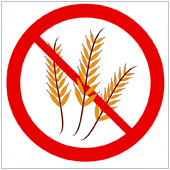 A gluten-free diet is a diet that completely excludes gluten. Gluten is a protein found in grains such as oats, barley, rye, wheat and triticale – a cross between rye and wheat. It is what makes dough elastic and usually plays a role in the final chewiness of bread.
A gluten-free diet is a diet that completely excludes gluten. Gluten is a protein found in grains such as oats, barley, rye, wheat and triticale – a cross between rye and wheat. It is what makes dough elastic and usually plays a role in the final chewiness of bread.
Recently, it’s been the topic of conversation in many circles. You have probably seen the words gluten-free written next to dishes on restaurant menus or on grocery store products. At the very least, you may have heard a close friend mention his or her gluten-intolerance. The gluten-free lifestyle is becoming increasingly popular as the number of people who voluntarily choose a gluten-free diet for weight loss or general health reasons combines with a skyrocket in the number of people with difficulty processing gluten.
Time Magazine recently rated the gluten-free movement second on its list of the top 10 food trends. And in one survey, one in three Americans said they were “trying to cut back or avoid gluten” in their diet. Another one in two believed gluten-free diet was a healthy option. This already tells you what the future holds. The message is spreading fast and more people are reconsidering their intake of gluten.
How bad is gluten?
There are mixed reviews and varied opinions from health and diet professionals. While some think the industry is reacting to a true health crisis, others think the current gluten craze is just one of the latest diet fads.
However, there is a genuine group of people who suffer from celiac disease and cannot tolerate even the slightest amounts of gluten. According to a Harvard report, this number could be as high as two million in the United States, while only about 300,000 have been diagnosed.
Celiac Disease
In people suffering from celiac disease, gluten triggers a response from the immune system that damages the lining of the small intestine often resulting in diarrhea and complications related to malnutrition – caused by inability to absorb minerals and vitamins. Sufferers report symptoms that include bloating, constipation, fatigue, headache and trouble concentrating, as well as weight loss. Diagnosis usually involves a biopsy along with several blood tests.
Although celiac disease is the most well-known side effect of consuming gluten, emerging evidence indicates that the now unpopular protein may also cause a condition known as non-celiac gluten sensitivity.
If you suspect that you might be reacting poorly to gluten foods, speak with your healthcare professional. For the most accurate results, get tested for the disease before beginning a gluten-free diet.
Unless you are experiencing one or all of the symptoms listed above, a gluten-free diet may not be necessary for you. Prior to beginning any new diet, it’s always smart to consult your doctor. At [company_short], your neighborhood healthcare experts are always a resource available to you. Please don’t hesitate to give us a call or visit the store to discuss any concerns.